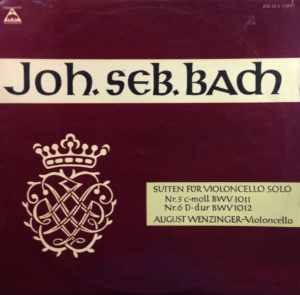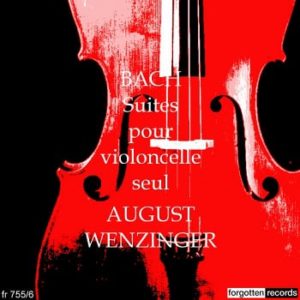

August Wenzinger Bach Cello Suites original release 1961 Barenreiter-Muicaphon BM 30 L 1507-9. CD release Forgotten Records fr 755/6.
Recording dates Sept 1960 and June 1961 Studio Dr. Tienhaus, Hamburg-Blankenese.
Sadly,the notes give no information about cello, bow or strings used.
Introduction.
August Wenzinger being a performer I know nothing of, surprises. Born in Switzerland, he is a contemporary of Henri Honegger. His recording output is extensive with 60 or so recordings released between 1955 and 1980 almost exclusively of baroque music.
One of his teachers included Emanuel Feuermann, Nevertheless, he seems to have specialised in the playing of Viols. However, his legacy for us all is his editing of Bach Cello Suite sheet music. His best selling Barenreiter edition is the most honest and faithful, being based on the Anna Magdalena edition. Wenzinger is explicit as to what is copied directly and what is added by himself. More information along these lines can be found here:
As much as is easily available to find out about this cellist can be found here:
Given his background, one could reasonably expect that Wenzinger’s recording of the Bach Suites is definitive and well respected. On the basis of my audition I would say it is certainly definitive and well ahead of its time. It seems however, to gather scant regard by reviewers and consumers alike. Apart from the original releases in 1961 there has been no re releases in any form apart from the forgotten records CD I have used for this review. The recording is not available on the usual streaming services either! Original copies of the LP are selling at around £100 per volume so even collectors do not appear to rate this recording that highly!
The Recording.
I have listened to a couple of Forgotten Records releases already and have their release of the Andre Levy recording to look forward to. They really are a great find. The quality of the transfer to digital is excellent with no audible clues to the vinyl master. I suspect the publishers have mastered the art of electronically removing surface noise and pops! Whilst being a mono recording, the sound stage is broad and the sound forward. It is possibly a little harsh and brittle but not offensive and remarkable considering the original recording is now 62 years plus old.
The music.
Nestling in amongst recordings by Fournier, Cassado and Starker, this performance stands out as being very contemporary in style. Whilst it sounds nothing like modern HIP by the likes of Watkin and Wispelwey, I note lacks of vibrato, is very rhythmic, and draws out well the continuo lines in the lower registers. If the sound quality of the recording was better, it could easily be considered the equal of many current releases. Certainly, it contrasts greatly with the full bodied tone of Starker and Cassado and the long flowing legato phrases of Fournier.
To my ears the performance feels more contemporary than that of Bylsma which is often considered to be the ground-breaking recording for Baroque versions of the Suites. It has to be pointed out that Wenzinger was pipped to the post by Annlies Schmidt who even used a five-string cello for the sixth Suite. However, quirks of speed lead me to consider this an interesting recording but not one that paved the way. I would suggest that Wenzinger predating Bylsma is the original torch bearer for Baroque interpretations.
There is no information to confirm or otherwise whether Baroque bow, end pin or gut strings were used. There is a photo on the internet with the man playing what I take to be a five string cello!
Some specifics
Significantly, the majority of the performances here are well judged tempo wise. There is little sense of rise and fall in the phrasing and little dynamic variation. However, the rhythm and clear continuo line make up for these deficiencies I feel.
There are a few quirks worth mentioning. The Minuets of Suite two have a dotted quaver rhythm which gives it a jolly lolloping feel but probably not to everyone’s taste!
The fourth Prelude has a slightly uneven feel to the quavers, giving it a slight limp. Nevertheless, it is refreshing to note the light touch given to the lowest notes.
The fourth gigue seems to have sections which sound distinctly sharp. Not sure if this could be down to any digitalisation process. It seems a little unexpected given the consistent intonation elsewhere.
Wenzinger plays the fifth Sarabande with a sense of great sadness without even a hint of vibrato. Possibly the speed is a little faster than ideal but that is hugely subjective.
Conclusion.
An unjustifiably neglected recording in my view. I’m minded to suggest that Anner Bylsma owed much to Wenzinger in that the latter had prepared the ground for the former. In any case I believe this recording stands on its own merits and deserves a place in any collection.
Charles.